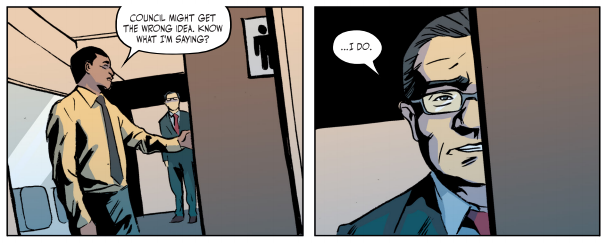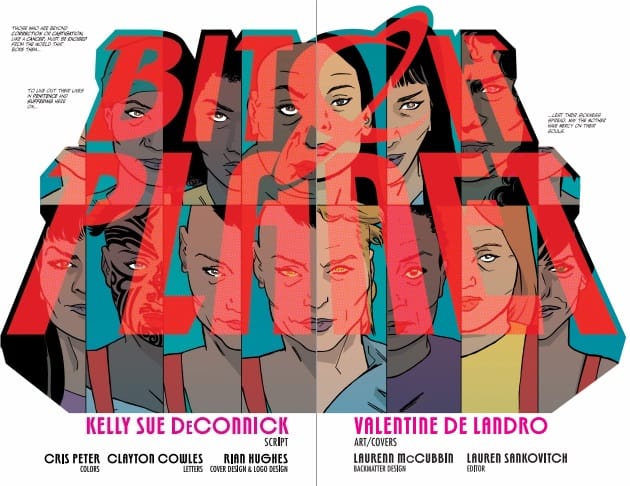
Kelly Sue Deconnick (writer), Valentine De Landro (artist), Image Comics
In Cell by Cell, I look deeply into the panels of an issue, appreciating and analyzing the story and artistic composition.
Pages 13-14 Overview
Switching back to the 8-panel structure for a two-person dialogue, these pages depict a conversation in the men’s bathroom between Maki and Carl, Father Josephson’s assistant. It appears straightforward enough, delving into Maki’s credentials for making the A.C.O. stadium but also exploring more of his anxieties. However, in the subtleties remain the intricacies of class and power and the structures that keep those without power from coming together in revolt.
This conversation occurs between two people under the thumb of Father Josephson. Carl speaks to Maki in a casual, joking manner, a level of ease assumed by their similarity of station. While Maki doesn’t exactly open up about the source of his anxiety, he does offer a joke at the expense of the rich to return the camaraderie Carl has initiated.
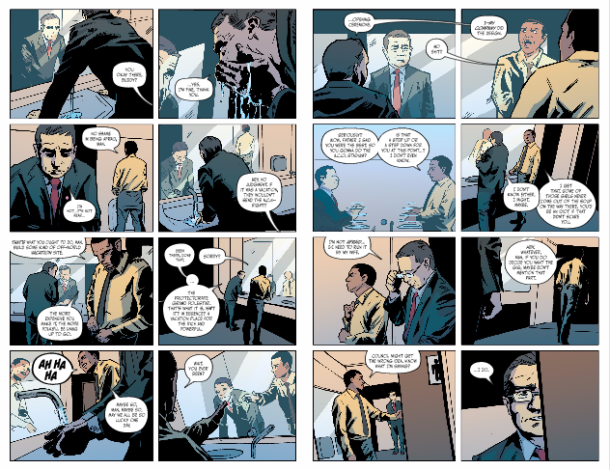
Page 13
Cell 1 gives a classic composition of Maki giving himself a hard look in the mirror. The mirror image of him suggests he’s of two minds, weighing a difficult question he’s not sure he has the right answer for. His distress is clear to those around him, since another person, out-of-panel to keep the composition tighter and focused only on Maki’s state-of-mind, asks, “You okay there, buddy?” The following close-up panel in cell 2 presents Maki’s response: “…Yes, I’m fine. Thank you,” with a bit of a side-eye glance while he splashes his face with water. It’s a polite put-off. The dialogue attempts to shut down further conversation, and the face washing tries to clear the evident anxiety from his face.
Cell 3 finally gives us a glimpse of who is talking to him–Carl, Father Josephson’s assistant, back to Maki, is using the urinal. For the next two panels, Carl and Maki do not face each other and do not make eye contact. I suspect that’s normal protocol in a men’s bathroom. However, Carl continues to press the anxiety issue, relieving the expectation of masculine strength by telling Maki there’s no shame in being afraid. The setting of the men’s bathroom highlights this theme while also practically giving these two men a space to meet and talk without Josephson there. It is the men’s room, where women do not belong, but it’s also the place where fears are properly flushed. Consider the phrases “piss yourself” or “shit yourself” with fear. Still, Maki denies it is fear.
Cell 4 has Carl reiterating that it would be okay to be afraid: “If it was a vacation, they wouldn’t send the N.C.s.” With the mention of vacation, Carl starts to make a comment about how there should be some off-world vacation spot in cell 5. The pricier it was, the more everyone would line up to go. This is a way of defusing any tension about the fear. Men, you know, don’t like to talk about it. It is also a critique on capitalism and consumerism. The assumption is that the better merchandise costs more, just like the assumption is the more valuable worker is paid more. But these assumptions are false. The price tag is manufactured as thoroughly as the merchandise, as is the worker’s value.
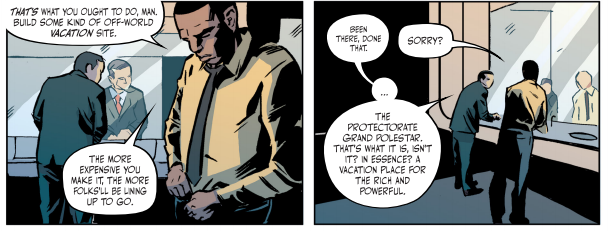
In cell 6, Maki is relieved at this turn of conversation and continues the joke by telling Carl he’s already done that in the form of the Protectorate Grand Polestar. Fancy pants name for fancy pants men. Carl appreciates the joke heartily in cell 7. Maki and Carl have now bonded through their mild critique of the rich. But these were jokes. The humor covers their asses from being seen as non-compliant.
Cell 8 shifts the tone. Carl realizes that Maki may have actually been to this infamous place for the upperest of crusts. He has sudden admiration for Maki, and the question of status comes back. Carl realizes both of them are quite close to that top tier of society–he as Josephson’s assistant, and Maki as the designer of the famed Polestar. I have to wonder if the relationship started here will come back later in the series. Perhaps these two will subvert the social hierarchy by manipulating the powerful men they work so closely with. To emphasize this relationship, the two are finally shown looking at each other, next to each other.
Page 14
Cell 1 and 2 are two sides of the conversation. The panel break is completely unnecessary, since the two images are meant to fit together. Structural symbolism. These two men are bonding in the bathroom. It’s not incredibly deep right now, so the bar remains, but what they are learning about each other is that they are similar. The bar between them, keeping them in their places in society, keeping them from rising up, is manufactured. In cell 3, while drying their hands, they finally face each other and look each other in the eyes. This is the moment of coming together. The bar is now gone, indicating there is hope of these two subverting the ways society attempts to pit them against each other in competition for resources and status. In fact, Duemila is one of these tools as Josephson’s speech about tribes from issue 2 expresses clearly. Manufactured conflict keeps the power structure the same. They’re the enemy, the powerful say, not us.
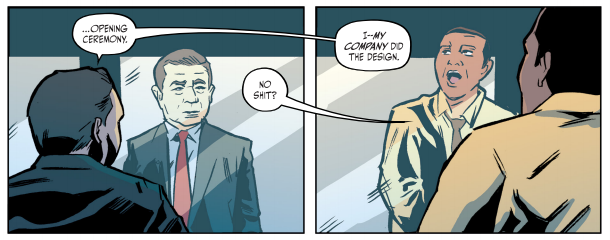
Cell 4 brings the conversation back to fear–the flight off world is like any anesthesia, one doesn’t always wake up. To boost the tension, De Landro gives the composition a slightly canted, or Dutch, angle. In cell 5, Maki finally feels like he can tell Carl what his anxiety is about: telling his wife. But the bond is broken here, and the line on the wall behind them shows this break visually. Carl may share critical thoughts of the power structure, but he’s largely drunk the kool-aid regarding gender roles. In cell 6, he laughs off Maki’s concern about his wife’s opinion. “Heh. Whatever, man.” Again, we get a canted angle to show the tension. Carl has turned his back to Maki, lost respect for him. He begins to leave.
As he opens the door to go in cell 7, he finishes a piece of advice for Maki to not share that concern with the Council, adding, “Know what I’m saying?” Cell 8 finishes the scene with Maki responding, “I do.” This foreshadows the later development of why Meiko is at the A.C.O. Maki has dealt with non-compliant accusations before. His split face, cut off by the door, suggests that part of him is missing. This is the opposite of the mirrored “two-minds” image. This composition points directly at the idea that men are also damaged by the standards of gender compliance. Maki is missing someone, his daughter. And his concern about his wife’s opinion tells us he values the equal participation of women in his life.
